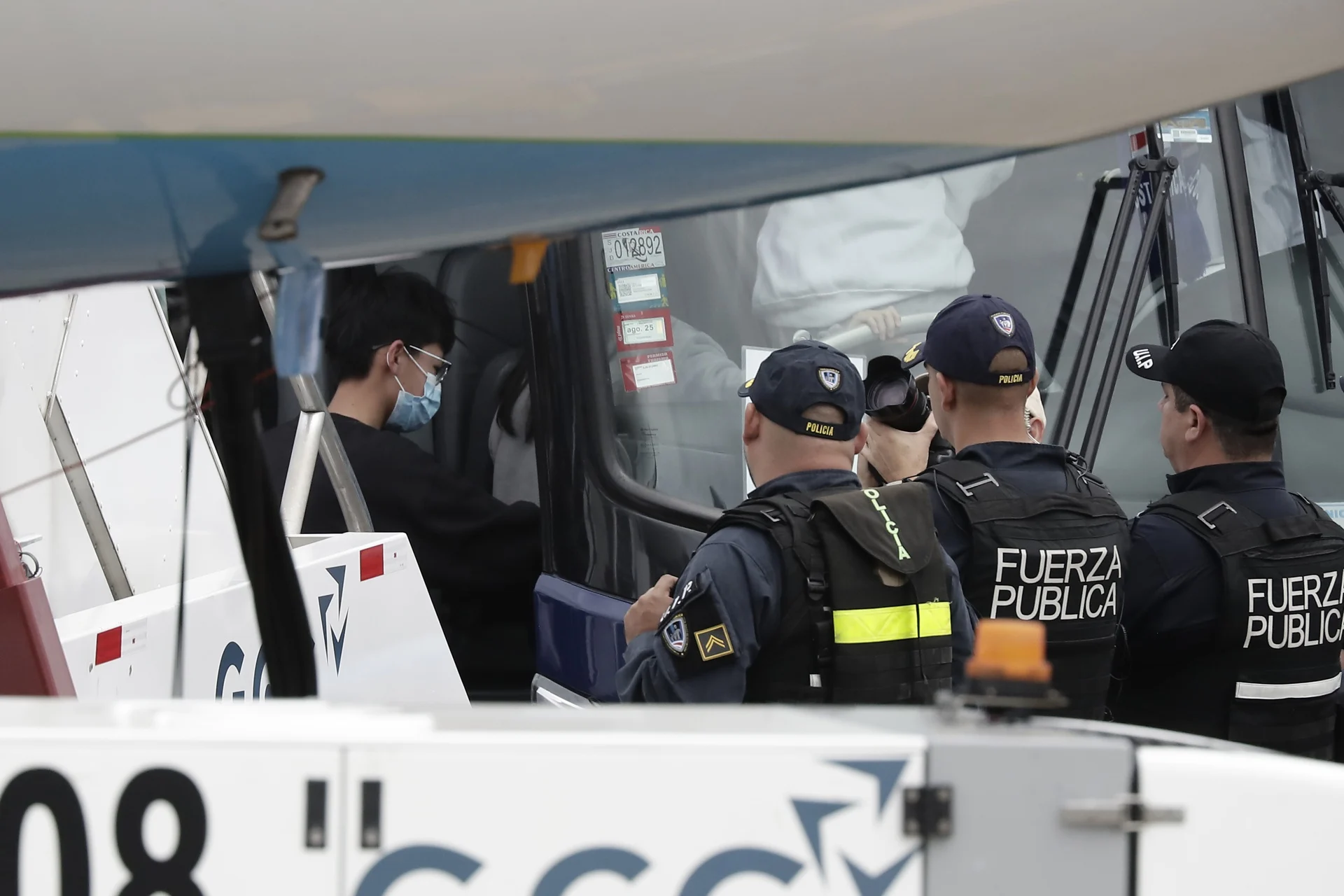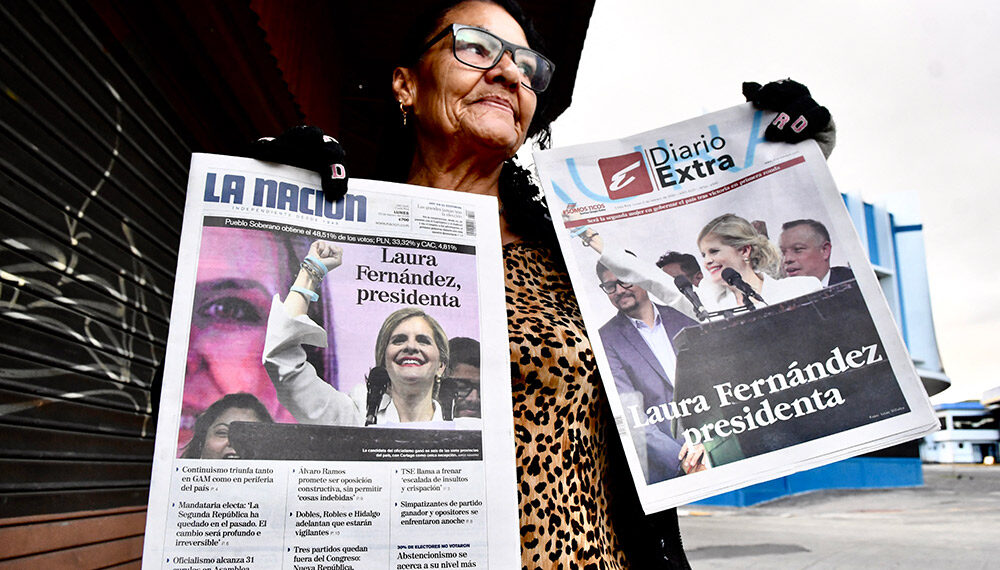Central America
Costa Rica extends humanitarian status and grants work permits to stranded migrants

The Costa Rican government announced on Tuesday the extension of a humanitarian migration category and the granting of work permits to a group of migrants from various nationalities who were stranded in the country after being deported from the United States last February.
“A new extension of this humanitarian category has been published, allowing these individuals to maintain regular status in Costa Rica for six months. One of the new features is that they now have the right to work, which will help facilitate their integration into the country,” said Migration Director Omer Badilla.
In February, Costa Rica received two flights carrying 200 deported migrants from the United States, including 81 minors. They came from Nepal, China, Russia, India, Congo, Afghanistan, Armenia, Azerbaijan, Georgia, Ghana, Iran, Jordan, Kazakhstan, Turkey, Uzbekistan, and Vietnam. The Costa Rican government said at the time that this was part of an agreement with the Trump administration for Costa Rica to serve as a transit point for migrants returning to their countries or a third country.
The migrants were taken to the Temporary Migrant Care Center (CATEM) in southern Costa Rica near the Panama border. Nearly half returned voluntarily to their countries, others sought asylum in Costa Rica, some left the center, and others remain voluntarily.
Currently, 25 migrants remain at CATEM voluntarily. According to authorities, the humanitarian migration status allows them free mobility and now the possibility to seek employment.
The acceptance of these 200 migrants sparked controversy in Costa Rica, with several NGOs denouncing that authorities violated human rights by not allowing the migrants to move outside CATEM for two months until the humanitarian migration status was first established in April.
Central America
Laura Fernández Says She Will ‘Never’ Allow Authoritarianism in Costa Rica

Costa Rica’s president-elect, right-wing leader Laura Fernández, said she will “never” allow authoritarianism under her government, in her first speech after winning Sunday’s presidential election.
Fernández, the political heir of outgoing President Rodrigo Chaves, has been accused by her opponents of seeking to steer the country toward authoritarian rule through her hardline proposals against drug trafficking and plans to reform state institutions.
“I, as the new president of the Republic, will never allow authoritarianism or arbitrariness—things that no one wants in Costa Rica,” Fernández said to cheers from her supporters gathered at a hotel in the capital.
The 39-year-old political scientist criticized her rivals for centering their campaign on what she described as a narrative of “authoritarianism and dictatorship.”
“They tried to scare voters, but the electorate did not fall into the trap,” she said.
Without offering details, Fernández acknowledged that her administration will seek to change the country’s “political rules of the game,” in what she described as a necessary step for Costa Rica, one of Latin America’s most stable democracies.
Central America
Costa Rica Goes to the Polls as Voters Choose Continuity or Change

Costa Ricans head to the polls today to elect the president of the republic and 57 members of the Legislative Assembly for the 2026–2030 term. Voters must choose between continuing the political project of outgoing President Rodrigo Chaves by supporting the ruling right-wing candidate Laura Fernández, or opting for a change in direction proposed by the opposition.
Fernández, representing the Pueblo Soberano Party (PPS), leads opinion polls with close to 40% of voting intention, bolstered by the outgoing president’s approval rating, which exceeds 50%. Chaves is barred from seeking immediate re-election under Costa Rican law.
Trailing far behind is Álvaro Ramos of the National Liberation Party (PLN), with less than 10% support. He is followed by Claudia Dobles of the Citizen Agenda Coalition (CAC), Fabricio Alvarado of New Republic (NR), and Ariel Robles of the Broad Front (FA), each polling between 3% and 5%. Undecided voters, who account for more than 30% of the electorate, could determine the outcome of the presidential race or force a runoff.
In a statement, Costa Rica’s Supreme Electoral Tribunal (TSE) reaffirmed its commitment to transparent and secure elections. “As has been the case for more than 76 years of democratic life in our country, the Supreme Electoral Tribunal guarantees all Costa Ricans that the national elections to be held this Sunday, February 1, will meet the highest standards of security and absolute transparency, allowing us to continue enjoying electoral processes in peace and freedom,” the institution said.
Authorities reported that 53,251 party observers will take part in the electoral process. Of these, 12,472 belong to the Social Christian Unity Party, 11,524 to Pueblo Soberano, 10,451 to the PLN, and 4,141 to the Citizen Agenda Coalition, among others. In addition, six political parties have sworn in 7,520 members of polling station boardsdeployed nationwide.
Central America
U.S. and Guatemala Sign Trade Deal Granting Zero Tariffs to Most Exports

The United States signed a reciprocal trade agreement with Guatemala on Friday, under which 70.4% of Guatemalan exports will enter the U.S. market tariff-free.
Guatemalan President Bernardo Arévalo highlighted the importance of the agreement, stating that it creates a framework of cooperation, certainty, and new opportunities for producers, workers, and entrepreneurs in the country. His remarks were shared in a video published on his official social media channels.
In 2025, 30.3% of Guatemala’s total exports were destined for the United States, amounting to approximately $4.3 billion. As a result, the agreement is expected to directly benefit key sectors of the Guatemalan economy, including agribusiness, manufacturing, and the textile industry.
“Today we have taken another step toward consolidating a country that, when it moves forward united, generates confidence, attracts investment, and creates real development opportunities for all its people,” Arévalo added.
The agreement with Guatemala follows a similar trade deal signed by the United States with El Salvador on Thursday, which includes the elimination of a 10% tariff on Salvadoran imports.
-

 International2 days ago
International2 days agoEpstein Denies Being ‘the Devil’ in Newly Released Video Interview
-

 International2 days ago
International2 days agoSpain Seeks to Ban Social Media Access for Children Under 16
-

 International2 days ago
International2 days agoMexico to Send Humanitarian Aid to Cuba Amid U.S. Threats Over Oil Shipments
-

 International2 days ago
International2 days agoPetro Resumes Extraditions, Sends Top Criminal to U.S. Before White House Talks
-

 International2 days ago
International2 days agoHypothermia Linked to Most Deaths During New York’s Recent Cold Spell
-

 International2 days ago
International2 days agoMexico Arrests Suspect in Shooting of Sinaloa Lawmakers
-

 International19 hours ago
International19 hours agoDelcy Rodríguez Takes Control of Chavismo as Venezuela Enters a U.S.-Supervised Transition
-

 Central America4 days ago
Central America4 days agoCosta Rica Goes to the Polls as Voters Choose Continuity or Change
-

 International19 hours ago
International19 hours agoHRW Warns Trump’s Influence Has Weakened Human Rights in Latin America
-

 Central America2 days ago
Central America2 days agoLaura Fernández Says She Will ‘Never’ Allow Authoritarianism in Costa Rica
-

 International2 days ago
International2 days agoNFL Investigating Emails Linking Giants Executive to Jeffrey Epstein


























